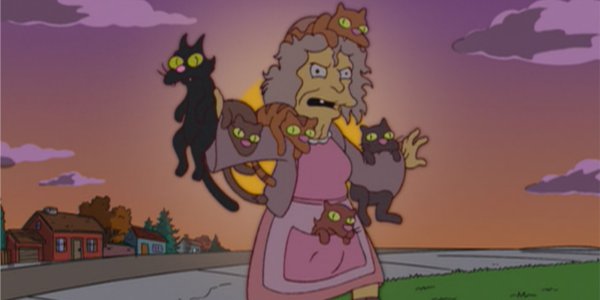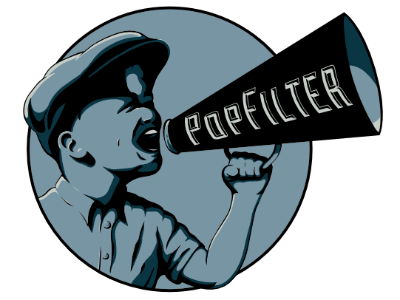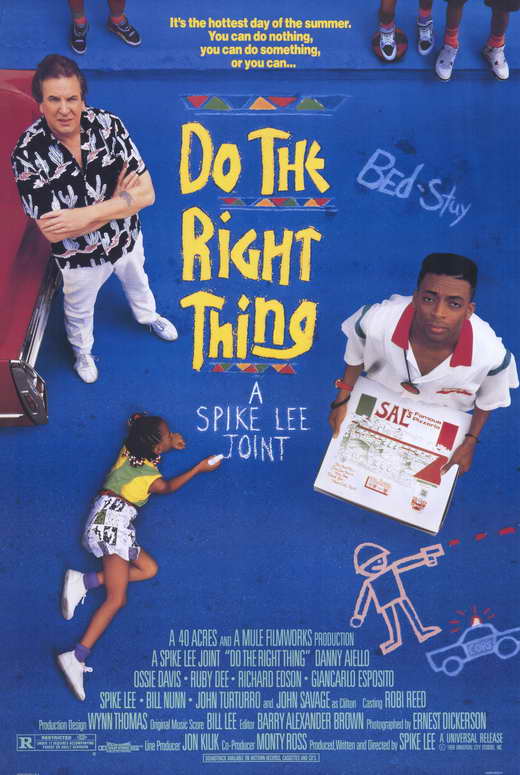Kerri Battles the AFI’S Top 100: #96 – Do The Right Thing
This week wasn’t the first time I’d seen Do The Right Thing. As I’ve mentioned before, I have a film degree and this flick is something of a film school darling. I’d been forced to watch it on more than one occasion, each time with explicit instructions to take note of Lee’s use of color and visual metaphors or his unique camera work and editing style. This viewing, though, would be the first time I’d ever sat down and just watched the fucking movie and I was really excited. Instead of analyzing just one of its pieces of construction at a time, I thought I was finally going to be able to swallow and digest Spike Lee’s story as a whole once and for all. Now, 24 hours after the credits have rolled, I don’t feel like I’ve digested anything at all, like when you choke on a hot mozzarella stick because the cheese already sliding down your throat is still connected to the crispy batter in your hand. The only thing I know for sure is that this isn’t an easy movie to crack jokes about.

“Bitch Please” stink eye from Prince is , in my opinion, the worst possible outcome for any scenario ever.
In the simplest and most basic terms, Do The Right Thing takes place on an outrageously hot day in the predominantly black Bed-Stuy. The story focuses on the lives and interactions of the residents of this block, specifically American-Eyetalian pizzeria-owner Sal, his racist son, his stupid son, his delivery guy, and a patron who really, really believes Sal should add some black people to his American-Eyetalian Wall of Fame. Tensions rise and become palpable until, ultimately, they explode, resulting in a tragic death, a riot, and the decimation of Sal’s Famous Pizzeria. The film ends by rolling the following quotes in this order:
Violence as a way of achieving racial justice is both impractical and immoral. It is impractical because it is a descending spiral ending in destruction for all. The old law of an eye for an eye leaves everybody blind. It is immoral because it seeks to humiliate the opponent rather than win his understanding; it seeks to annihilate rather than to convert. Violence is immoral because it thrives on hatred rather than love. It destroys a community and makes brotherhood impossible. It leaves society in monologue rather than dialogue. Violence ends by defeating itself. It creates bitterness in the survivors and brutality in the destroyers. — Martin Luther King, Jr.
I think there are plenty of good people in AMerica, but there are also plenty of bad people in America and the bad ones are the ones who seem to have all the power and be in these positions to block things that you and I need. Because this is the situation, you and I have to preserve the right to do what is necessary to bring an end to that situation, and it doesn’t mean that I advocate violence, but at the same time I am not against using violence in self-defense. I don’t even call it violence when it’s self-defense, I call it intelligence. — Malcolm X
Then, if I alone am any indication, the audience sits in silence, gobsmacked, contemplating all the times they’ve ever done the wrong thing and thought it was the right thing and vice versa, wondering if there ever is a right thing, and appreciating the fact that they interact more with their cats than they do actual human beings, who all apparently suck.

Kerri: A Portrait
There is a lot to unpack in this film and, frankly, Your Pop Filter isn’t the place to do it. You know where you clicked and you know I didn’t sign up to write deeply insightful social commentary for free. I signed up to make with the pop culture jokes for free, obviously, and Spike Lee is not making my amateur gig any easier. How do I mock a film about cultural and racial identities and tensions when, at the time this film was released, I was roughly 8 years old and living an almost Donna-Reed-dream-childhood in the real world manifestation of Pleasantville? I had no frame of reference to even begin to understand the motivations behind the actions of some of these characters. In an effort to try to wrap my head around everything I had just watched, the first thing I did was turn to the internet for guidance. I googled, “Did Mookie do the right thing?” and was immediately comforted by the number of results at my disposal. I began clicking through and eventually found my way to the film’s Wikipedia page. Under the “Controversies” heading, I found this gem:
Spike Lee has remarked that he himself has only ever been asked by white viewers whether Mookie did the right thing; black viewers do not ask the question.[12] Lee believes the key point is that Mookie was angry at the death of Radio Raheem, and that viewers who question the riot’s justification are implicitly failing to see the difference between property and the life of a black man.[10]

… Oh … That’s not what I … Nevermind…
The above references a DVD commentary I haven’t heard, so I’m not certain of the context or even the actual quote itself, but just the gist provided leaves me skeptical. I don’t believe Spike Lee really thinks it’s that simple because I’ve seen Do The Right Thing. The film itself watches like a live-action comic book, simultaneously managing to achieve both subtly and overtness. No one character is a clear-cut hero or villain. The closest to being 100% pure of heart is Da Mayor, and he spends all day either drunk or sweeping sidewalks for a dollar so he can get drunk. No one is without their faults and flaws. No one is without their prejudices. No one is above their own level of racism and no one can tell someone else what The Right Thing is. And no where could I locate a quote from Spike Lee that definitively answers my googled question. I’m sure he has an answer, but that answer appears to be his own. That leads me to believe that the answer isn’t as important as the question. Not just my specific (apparently racist) question, but all questions raised by this film. Almost 25 years ago, audiences were probably discussing the finely crafted minutia and nuance of the film in regards to its level of accuracy in reflecting current society. Today, we discuss the same, which proves that we, as a society, have learned nothing beyond the fact that neon, day-glow spandex and multiple pairs of color-coordinated slouch socks is never a good look for anyone. Which, incidentally, is a really, really good lesson to learn. It just probably shouldn’t be the point where we all collectively stop and say, “We realized the errors of our 80s fashion! Isn’t that enough growth for once society?” –KS

